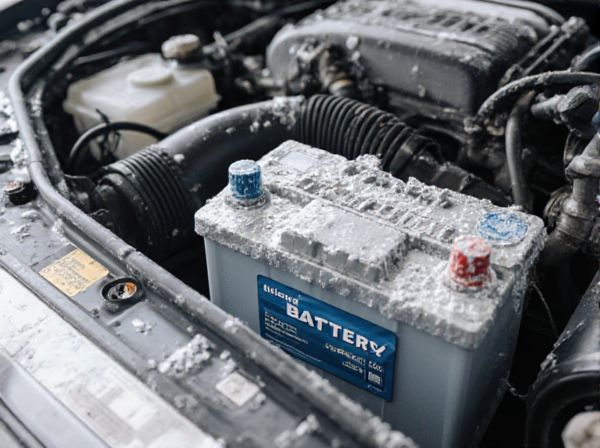
Photo illustration: Silver-Calcium vs Enhanced Flooded
Silver-Calcium batteries offer superior corrosion resistance and longer life cycles compared to Enhanced Flooded Batteries, making them ideal for heavy-duty applications. Enhanced Flooded Batteries provide reliable starting power with improved charge acceptance and vibration resistance but typically require more maintenance. Choosing the right battery depends on Your specific needs for durability, performance, and maintenance frequency.
Table of Comparison
| Feature | Silver-Calcium Battery | Enhanced Flooded Battery (EFB) |
|---|---|---|
| Technology | Silver-Calcium alloy plates | Improved flooded lead-acid design with enhanced grids |
| Cycle Life | Longer cycle life, up to 1500 cycles | Moderate cycle life, around 800-1000 cycles |
| Durability | High resistance to corrosion and sulfation | Better resistance than standard flooded battery but less than Silver-Calcium |
| Performance | Stable power output, ideal for high electrical loads | Improved charge acceptance and recovery under partial state of charge |
| Maintenance | Low maintenance, often sealed | Requires periodic electrolyte checks and water addition |
| Cost | Higher initial cost | More affordable, mid-range price |
| Best Use Case | High-performance vehicles, heavy electrical demand | Start-stop vehicles with moderate electrical loads |
Introduction to Silver-Calcium and Enhanced Flooded Batteries
Silver-Calcium batteries use an alloy of silver and calcium in their grid plates, offering improved corrosion resistance and higher charge acceptance compared to traditional lead-acid designs. Enhanced Flooded Batteries (EFB) incorporate specialized paste formula and reinforced grids to provide better cyclic durability and deep discharge recovery, making them suitable for start-stop vehicle systems. Both technologies enhance performance and lifespan over standard flooded batteries but differ in materials and applications tailored to specific automotive demands.
Key Differences Between Silver-Calcium and Enhanced Flooded Technologies
Silver-Calcium batteries feature plates alloyed with silver and calcium that improve corrosion resistance and extend battery life, while Enhanced Flooded Batteries (EFB) enhance traditional flooded designs with added carbon to increase charge acceptance and cycling durability. Silver-Calcium technology offers higher resistance to high temperatures and reduced self-discharge, making it ideal for start-stop vehicles and high-demand applications. In contrast, EFB technology provides better charge efficiency and improved cycling performance, resulting in greater reliability for vehicles requiring frequent engine restarts and deeper discharge cycles.
Construction and Chemical Composition Comparison
Silver-Calcium batteries feature lead grids alloyed with silver and calcium, enhancing corrosion resistance and mechanical strength for improved durability. Enhanced Flooded Batteries (EFB) utilize lead-calcium alloy grids with optimized paste density, supporting better charge acceptance and cycling performance in partial state-of-charge conditions. Chemically, the silver in Silver-Calcium grids improves conductivity and reduces water loss, while EFBs balance calcium content to minimize sulfation, making each design suited for specific automotive energy demands.
Performance and Efficiency Analysis
Silver-Calcium batteries offer superior corrosion resistance and higher charge retention compared to Enhanced Flooded Batteries (EFB), resulting in improved lifespan and reliability under demanding conditions. EFBs provide enhanced cyclic durability and faster recharge capabilities, making them suitable for start-stop vehicle systems with frequent engine restarts. Performance analysis highlights Silver-Calcium batteries' efficiency in maintaining stable voltage and reducing self-discharge rates, while EFBs excel in deep cycling and effective energy recovery during regenerative braking.
Lifespan and Durability Factors
Silver-Calcium batteries offer superior corrosion resistance and enhanced lifespan, typically lasting up to 50% longer than Enhanced Flooded Batteries (EFBs) under similar operating conditions. Their advanced grid alloy composition improves durability by minimizing water loss and maintaining optimal charge efficiency, making them ideal for high-demand applications. Enhanced Flooded Batteries, while cost-effective, generally experience higher degradation rates due to increased susceptibility to sulfation and acid stratification, reducing their overall durability.
Maintenance Requirements and User Considerations
Silver-Calcium batteries require minimal maintenance due to their enhanced corrosion resistance and reduced water loss, making them ideal for users seeking low upkeep. Enhanced Flooded Batteries (EFB) demand more frequent checks and water top-ups, suited for applications with moderate cycling and budget-conscious users. Users prioritizing longevity and minimal maintenance often prefer Silver-Calcium technology, while EFB batteries balance performance and maintenance in dynamic driving conditions.
Charging and Discharging Characteristics
Silver-Calcium batteries exhibit lower self-discharge rates and higher charge acceptance, allowing for faster and more efficient charging compared to Enhanced Flooded Batteries (EFB). During discharging, Silver-Calcium batteries maintain more stable voltage levels and provide better resistance to sulfation, resulting in improved deep-cycle performance and longer battery life. EFB batteries, while designed for enhanced cycling and durability, tend to have higher internal resistance, leading to slower charge times and reduced efficiency under high load conditions.
Cost Comparison and Value for Money
Silver-Calcium batteries typically come at a higher upfront cost compared to Enhanced Flooded Batteries (EFB), reflecting advanced technology and improved performance. Despite the greater initial investment, Silver-Calcium batteries offer longer lifespan and better resistance to corrosion, which can reduce replacement frequency and maintenance expenses. EFB batteries provide a more budget-friendly option with reliable performance, making them suitable for standard applications where cost efficiency is the priority.
Applications: Ideal Uses for Each Battery Type
Silver-Calcium batteries excel in automotive applications requiring high corrosion resistance and extended battery life, such as luxury cars and diesel engines. Enhanced Flooded Batteries (EFB) are specially designed for vehicles with start-stop systems and mild hybrid applications, offering improved cyclic durability and charge acceptance. Fleet vehicles and commercial transport benefit from EFB's robustness in frequent start-stop conditions, while Silver-Calcium is preferred for long-term reliability in traditional combustion engines.
Choosing the Right Battery: Silver-Calcium vs Enhanced Flooded
Silver-Calcium batteries offer superior corrosion resistance and longer lifespan due to their metal alloy plates, making them ideal for vehicles with high electrical demands. Enhanced Flooded Batteries (EFB) provide improved charge acceptance and cyclic durability compared to traditional flooded batteries, suited for stop-start systems. Selecting the right battery depends on your vehicle's power requirements and driving conditions, where Silver-Calcium excels in durability and EFB benefits frequent start-stop use.
 caratoz.com
caratoz.com